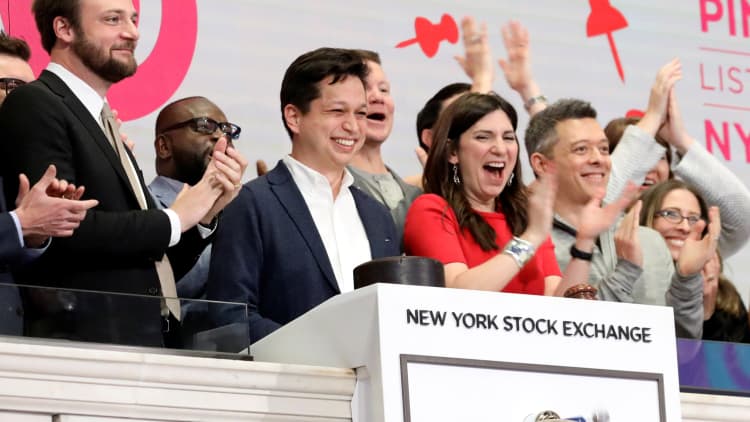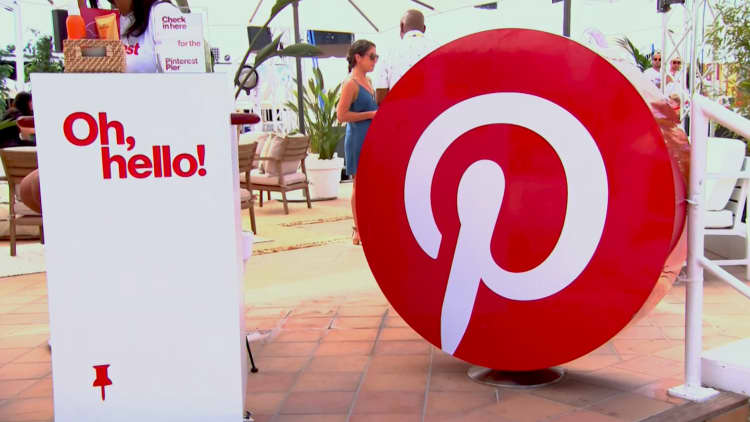Ben Silbermann became a very rich man on April 18 when Pinterest began trading as a public company on Wall Street, but the co-founder and CEO of the virtual pinboard could have been significantly richer. On Monday it was estimated that he is now worth $1.6 billion. The company's valuation on Tuesday reached near-$14 billion in trading.
It's just back-of-envelope math, but David Snider, founder and CEO of Harness Wealth, estimates Silbermann could have pocketed another $150 million or so if he'd been a little smarter about handling his options in the walkup to the IPO.
Silbermann's paper losses are significantly higher than the average employee of Pinterest, or any company that's going public, but the issues that resulted in the situation are fairly common.

In Silbermann's case, he received 31.2 million options in 2013, but based on Pinterest's S-1, they remain unexercised. Had he exercised them when the opportunity arose, they likely would have been eligible for long-term capital gains. Now he'll face short-term capital-gain taxes that could be as high as 45%.
The clock for long-term capital gains treatment starts once someone holds stock vs. a stock option. Typically, founders will either receive or take their equity ownership in stock from day one, or exercise their stock options when they're granted — when they have very little perceived tax value from an IRS standpoint. Assuming they hold those for a year or more, the proceeds, when they ultimately sell them, are considered long-term gains. Silbermann didn't exercise the options, though, and the value when he does (assuming he does at all) will be considered in the tax calculation. By exercising the options when they had a low value, he could have taken the most tax advantageous route.
But Silbermann hasn't always done things in the typical Silicon Valley start-up founder fashion. He preferred to avoid the press over the years; rejected the move-fast, break-things and chase-growth-at-all-costs unicorn mantra and refused to shell out tens of millions of dollars in marketing at a time when growth was slowing for the company. When Pinterest finally went public, Silbermann did not include a founder's letter in the S-1 filing, a soapbox many new tech titans use to sing the praises of how their firm is changing the world for the better.
A turning point in the life of a company
IPOs, especially successful ones like Pinterest, can make instant millionaires out of early employees and garner profitable new opportunities for a company, but they can also bring about decisive changes in the workplace.

"There's a really big psychological shift from going from 'my stock has gone up again' with another valuation round to watching it change on a minute-to-minute basis," said Snider. "Even if you believe in the technology, it's going to take several years for it to grow and realize its full potential."
There's also the risk of a culture shift, as executives are required to focus more on shareholder concerns. And slip-ups that might have been minor when they were in stealth mode or private can now be stock-altering events.
"[Any company with a successful IPO] does carry the challenge of being part of a public company," said Snider. "There's more scrutiny. The public gets more information, but employees often get less, because senior management has to make sure there's no information provided to employees that can leak out and affect the company."
The talent squeeze
It's not just investors watching how a company performs after its IPO, it's potential employees as well. Should executives misjudge the market and face a significant drop after trading begins (and no subsequent recovery), it becomes very challenging to bring on quality talent.
As a private company, it's easy for potential employees to follow funding rounds. Bigger rounds generally attract more qualified workers. But "if you're a company that goes through a 60% market dip, it's going to be a lot harder to attract those," said Snider.
As for Pinterest, the day one results were encouraging. It will, of course, be months before we see if that market optimism is sustained. Employees are hoping so for several reasons, but largely because they want the stock to be high when their lockout period expires.

Many employees with vested options or who hold shares will likely cash out some of their shares when Pinterest's lockout expires. Unlike Uber, which has had several liquidity events for employees, Pinterest hasn't had the chance to cash in their holdings for five years, said Snider. The opportunity to cash in now will be very tempting to some.
And it's not a bad idea to take advantage of that opportunity. Holding stock in your company isn't a bad idea, but diversifying that wealth is a better long-term plan.
For many, like Silbermann, the first steps in that diversification should have started years ago. (Mark Zuckerberg, for instance, broke up his assets into a trust and other places to lighten the tax burden when Facebook went public.)
It's likely too late for Pinterest employees who weren't proactive in their planning. But for employees at other pre-IPO companies, Snider said it's important to know what type of stock units you hold and the different tax implications you face when those shares are sold or options are converted.
One thing you probably won't see at Pinterest is a notable employee turnover in the immediate future. When a company IPOs, there are generally two factors that encourage workers to stay. Some simply haven't hit vesting milestones and stand to lose a considerable amount if they leave early. Others don't want to be forced to exercise options before they're able to sell shares, as it could create a tremendous tax burden.
Say, for instance, an employee was offered an option of 1,000 shares at 50 cents per share. If that option is exercised prior to the IPO, they simply write a check and hold on to the shares. If they were to exercise that option when the shares were selling for $100 each, that could be applied to their income, even if they don't or aren't able to sell the shares.
"Adding that value could bankrupt someone if they're not paying attention," said Snider. "They could be paper rich and cash poor."





